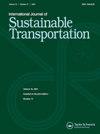A shift to green cybersecurity sustainability development: Using triple bottom-line sustainability assessment in Qatar transportation sector
IF 3.1
3区 工程技术
Q2 ENVIRONMENTAL STUDIES
International Journal of Sustainable Transportation
Pub Date : 2023-12-01
DOI:10.1080/15568318.2023.2171321
引用次数: 0
Abstract
Green cybersecurity is the emerging trend in the new era and this green cybersecurity technology minimizes the negative effects of IT operations and implements a green sustainable environment. Therefore, the study conceptually draws the concept of green cybersecurity by applying the theory of reasoned action (TRA) assumptions that logically support green information technology acceptance. Using a convenient sampling, the data were collected from Qatar transport industries, particularly the IT experts and managers, to get responses on the implementation of green cybersecurity and sustainability of 5 transport companies in Doha, Qatar. Using Smart PLS-SEM, the study employed the SEM technique to test the proposed hypotheses. The results reported that green cybersecurity’s control/position, integrity, and authenticity significantly and positively influenced TBL sustainability, but confidentiality, availability, and utility do not. The implementation of industry 4.0 makes them accessible and more effective to ensure TBL sustainable development in the transport industries in Qatar. Applying green cybersecurity in this setting will improve services in transportation sector. A green cybersecurity platform will make it a point to systematically search for and promote innovations made possible by smart green technologies to avoid carbon-emission vehicles. Through the efficient and cutting-edge green, cybersecurity will be Qatar’s transportation sector’s primary responsibility to contribute to Qatar’s sustainable development. In order to accomplish this goal, the regulator must create and implement it. In addition, it emphasizes the importance of adopting green cybersecurity to confront the difficulties facing city transportation all over Qatar as a foundational component of achieving long-term sustainable development.
向绿色网络安全可持续发展的转变:在卡塔尔交通部门使用三重底线可持续性评估
本文章由计算机程序翻译,如有差异,请以英文原文为准。
求助全文
约1分钟内获得全文
求助全文
来源期刊
CiteScore
8.90
自引率
2.60%
发文量
56
期刊介绍:
The International Journal of Sustainable Transportation provides a discussion forum for the exchange of new and innovative ideas on sustainable transportation research in the context of environmental, economical, social, and engineering aspects, as well as current and future interactions of transportation systems and other urban subsystems. The scope includes the examination of overall sustainability of any transportation system, including its infrastructure, vehicle, operation, and maintenance; the integration of social science disciplines, engineering, and information technology with transportation; the understanding of the comparative aspects of different transportation systems from a global perspective; qualitative and quantitative transportation studies; and case studies, surveys, and expository papers in an international or local context. Equal emphasis is placed on the problems of sustainable transportation that are associated with passenger and freight transportation modes in both industrialized and non-industrialized areas. All submitted manuscripts are subject to initial evaluation by the Editors and, if found suitable for further consideration, to peer review by independent, anonymous expert reviewers. All peer review is single-blind. Submissions are made online via ScholarOne Manuscripts.

 求助内容:
求助内容: 应助结果提醒方式:
应助结果提醒方式:


